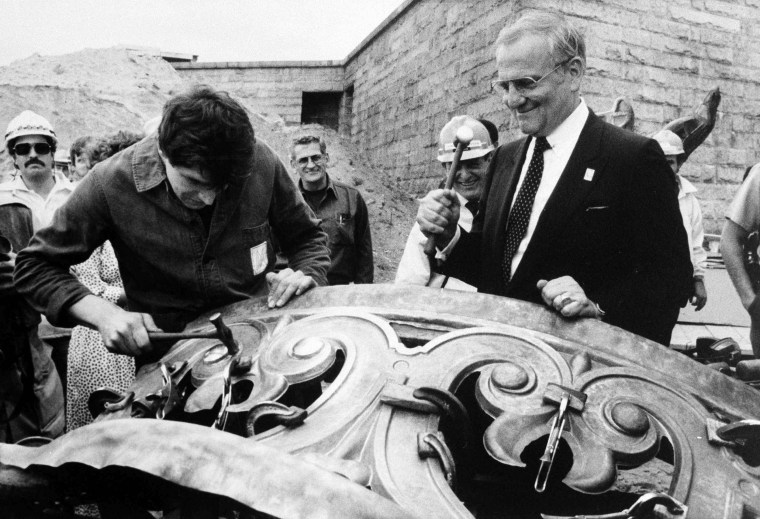He was the proud son of Italian immigrants who rose to become an American legend — in the process becoming one of the most powerful and influential executives in U.S. automotive history.
But in his final years, Lee Iacocca, who died Tuesday at the age of 94, said it was not his work in the auto industry that he was most proud of but his charitable efforts, which included playing the lead in the rescue of the crumbling Statue of Liberty and Ellis Island, where his parents first stepped on American soil.
Lido Anthony Iacocca was a trained engineer, but it was his uncanny marketing savvy, combined with his ability to speak the language “of the common man” that made him a household name, and in the 1980s, almost propelled him to run for president.
“Lee was one of few truly great leaders,” said Bob Lutz who, like Iacocca, worked at Ford and then moved to Chrysler as second-in-command. "He was my mentor, my teacher and role model. When he was on, he was fabulous. I will miss him.”
Iacocca’s was the classic Horatio Alger tale. He was raised in Allentown, Pennsylvania, and landed a fellowship that helped him go to Princeton University. Graduating in 1946, he immediately joined Ford and became a vice president at the age of 30. By 36, he was an executive vice president. He was named Ford president in December 1970, at 46.
By then, he had already accomplished a striking legacy that included the creation of the Ford Mustang. Developed at a cost of $75 million, Ford expected it to be a modest success when it debuted in the spring of 1964, selling perhaps 100,000 a year. In its first year, the figure came to 418,000 and today, 55 years later, the Mustang remains the world’s best-selling sports car.
But Iacocca had a tendency “to shake the bushes,” and rattle cages, something that didn’t sit well with Ford Chairman and family heir Henry Ford II, recalled Bud Liebler, who worked under the executive for many years, remaining friends with Iacocca until his death.
Better known as “the Deuce,” Ford fired Iacocca in 1978, reportedly telling him, “I just don’t like you.”
It didn’t take long to find new work: Iacocca moved across town to Chrysler. But the company was faltering, and as its new president and CEO — and, later, chairman — Iacocca had to come up with a rescue plan — fast. It was a complex package requiring concessions from workers, suppliers, bankers, dealers and both the U.S. and Canadian governments. When asked by a reporter what would happen if anyone balked, Iacocca tersely explained, “Then the pieces of the mosaic fall off the wall.”
The plan worked and Iacocca went on to oversee the creation of the K-Cars, which helped Chrysler turn the corner, and the minivans that, for years, were its most profitable products. He also ordered the purchase of American Motors, which included the Jeep brand that is the money machine for what is today Fiat Chrysler Automobiles.
Iacocca’s later years with Chrysler were testy, especially when he shifted focus to efforts to save the Statue of Liberty and Ellis Island. As the automaker started facing new financial problems, he was convinced to retire in 1992. But he attempted a comeback three years later, participating in a failed hostile takeover by billionaire Kirk Kerkorian.
The two later reconciled, with Iacocca appearing in several commercials for what was then DaimlerChrysler in 2005, including one with rapper Snoop Dogg who translated Iacocca’s catchphrase, “If you can find a better car, buy it” into “If the ride is more fly, then you must buy.”
Iacocca authored a number of books, tried his hand at marketing wine, olive oil and spaghetti sauce, and focused much of his latter-year efforts on charity.
“Lee had a touch of the common man,” Liebler said. “He could reach out and talk to people like no one else.”
